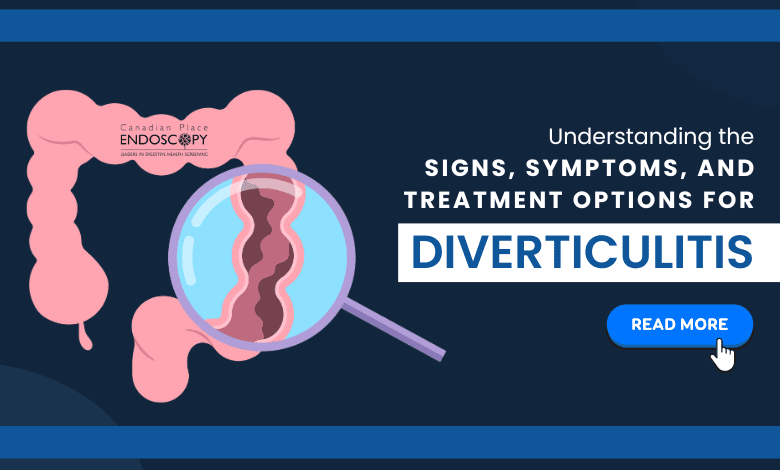Understanding the Signs, Symptoms, and Treatment Options for Diverticulitis

Diverticulitis is a common digestive ailment. It arises when small pouches (diverticula) within the digestive tract become inflamed or infected. These pouches, collectively termed diverticulosis, are often asymptomatic, with no noticeable signs or symptoms; however, when inflammation or infection occurs, it triggers discomfort and can lead to complications. The discomfort typically manifests as intense abdominal pain, while complications may include fever, changes in bowel habits, and, in severe cases, abscess formation or bowel obstruction. Recognizing the potential complications and promptly addressing symptoms is crucial for effectively managing diverticulitis and maintaining digestive health.
Recognizing the Signs and Symptoms
Recognizing the signs and symptoms of diverticulitis is crucial for timely intervention and effective management. From abdominal pain to changes in bowel habits, understanding the indicators is vital for seeking appropriate medical attention.
- Abdominal Pain: Diverticulitis typically shows intense, localized abdominal pain, often in the lower left side. The pain can be sudden and persistent, prompting individuals to seek medical attention.
- Fever and Chills: Inflammation or infection of the diverticula may lead to systemic symptoms like fever and chills. An elevated body temperature is a typical response to the body’s effort to fight the infection.
- Change in Bowel Habits: Diverticulitis can cause alterations in bowel habits, such as diarrhea or constipation. Some individuals may experience both, contributing to the overall discomfort.
- Nausea and Vomiting: Nausea and vomiting may accompany Diverticulitis, reflecting the body’s response to inflammation or infection. Persistent vomiting requires prompt medical evaluation.
- Abdominal Tenderness: Tenderness and sensitivity to touch in the abdominal area, particularly around the affected diverticula, are common signs. Palpation by a healthcare professional can help identify the tender areas.
Diagnosis and Consultation with a Gastroenterologist
Upon experiencing symptoms of Diverticulitis, it is crucial to consult a Gastroenterologist for a comprehensive evaluation. A Gastroenterologist specializes in digestive system disorders and plays a pivotal role in diagnosing and managing Diverticulitis.
- Clinical Assessment: The gastroenterologist performs a thorough clinical assessment, considering the patient’s medical history, symptoms, and physical examination findings. This examination helps in establishing the initial suspicion of Diverticulitis.
- Diagnostic Tests: Various diagnostic tests may be employed to confirm the diagnosis. These may include blood tests to check for infection or inflammation, imaging studies such as CT scans or ultrasound, and sometimes colonoscopy to assess the extent of diverticular disease.
Treatment Options for Diverticulitis
Exploring the diverse treatment options for Diverticulitis is essential in addressing this digestive ailment. From antibiotics to advanced Endoscopic procedures, understanding the available interventions is key for comprehensive care.
- Antibiotic Therapy: Mild cases of Diverticulitis may be treated with antibiotics to combat the infection. The choice of antibiotics depends on the severity of the condition and any underlying health issues.
- Pain Management: Pain relief is a crucial aspect of Diverticulitis treatment. Over-the-counter pain medications or prescription drugs may be recommended to alleviate discomfort. Rest and application of heat pads can also aid in pain management.
- Dietary Modifications: Gastroenterologists often recommend dietary changes to ease symptoms and prevent flare-ups. A high-fiber diet can help regulate bowel movements and promote digestive health. In some cases, a clear liquid diet may be initially advised.
- Hospitalization for Severe Cases: Severe cases of Diverticulitis, especially those with complications like abscess formation or bowel obstruction, may necessitate hospitalization. Intravenous antibiotics and, in some instances, surgical intervention might be required.
Interventional procedures for Diverticulitis
In recent years, advanced interventional procedures have emerged as valuable tools in managing diverticular disease.
- Interventional Drainage of Abscesses: Interventional radiologic drainage is a minimally invasive procedure for draining abscesses associated with Diverticulitis. It involves inserting a tube through the abdominal wall under imaging guidance to drain the abscess, often avoiding the need for open surgery.
- Colonoscopy for Evaluation: A colonoscopy may be performed during the recovery phase to assess the extent of diverticular disease and identify any other potential issues in the colon. It allows Gastroenterologists to tailor ongoing management strategies.
Canadian Place Endoscopy: A Center of Excellence
Canadian Place Endoscopy stands out as a leading center of excellence for individuals seeking specialized care for Diverticulitis. The center is renowned for its state-of-the-art facilities and a team of experienced Gastroenterologists and Surgeons, and it offers comprehensive diagnostic and therapeutic services.
Specialized Gastroenterologists:
The endoscopy clinic boasts a team of specialized Gastroenterologists with expertise in managing diverticular disease. Their commitment to patient care ensures thorough evaluations and personalized treatment plans.
Cutting-edge Endoscopic procedures: The center is equipped with cutting-edge technology, enabling advanced Endoscopic procedures for diagnosing and managing Diverticulitis. This includes minimally invasive techniques to enhance patient outcomes.
In conclusion, understanding the signs, symptoms, and treatment options for Diverticulitis is crucial for timely intervention. Consulting with a Gastroenterologist, or Surgeon, considering advanced interventional procedures, and seeking care from a renowned center like Canadian Place Endoscopy can contribute to effective management and improved quality of life for individuals affected by Diverticulitis.
Explore the endless possibilities of words and creativity at www.wordplop.com – where imagination meets expression.






